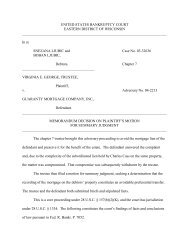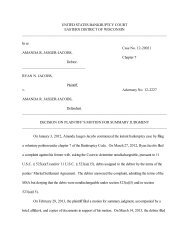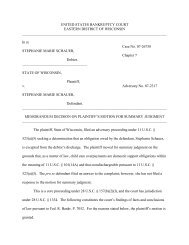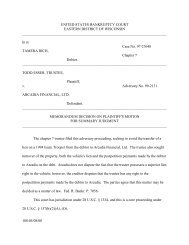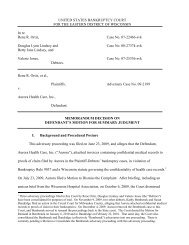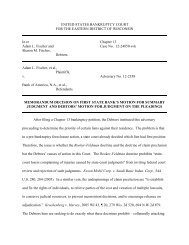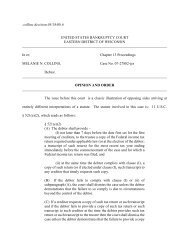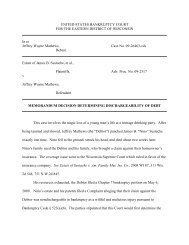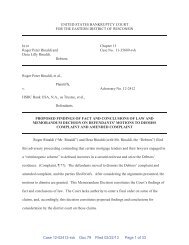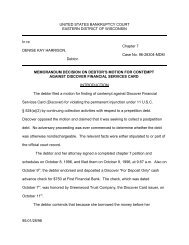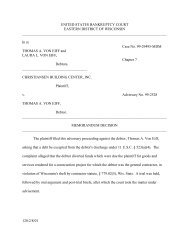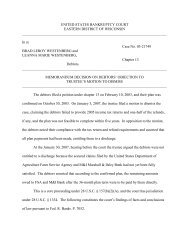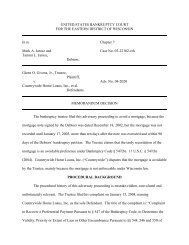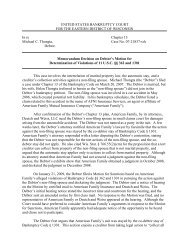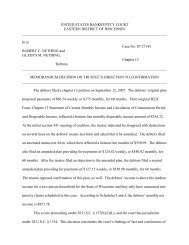In re Krystal Papcke, Case No. 99-24700, Bruce Lanser, Trustee v ...
In re Krystal Papcke, Case No. 99-24700, Bruce Lanser, Trustee v ...
In re Krystal Papcke, Case No. 99-24700, Bruce Lanser, Trustee v ...
You also want an ePaper? Increase the reach of your titles
YUMPU automatically turns print PDFs into web optimized ePapers that Google loves.
However, because the debtor's payments to the secu<strong>re</strong>d c<strong>re</strong>ditor we<strong>re</strong> on a mortgage for which<br />
both the debtor and his former wife we<strong>re</strong> obligated, the payments benefitted both the debtor's<br />
property and that of his former wife. Thus, only one-half of the payment to the secu<strong>re</strong>d c<strong>re</strong>ditor<br />
was avoidable as a p<strong>re</strong>fe<strong>re</strong>nce. Id. at 384.<br />
Whether the payment to the defendant could have been or may now be claimed exempt is<br />
not one of the defenses in 11 U.S.C. § 547(c). A transfer that could be claimed exempt by the<br />
debtor befo<strong>re</strong> filing does not mean that the funds a<strong>re</strong> exempt in the hands of the c<strong>re</strong>ditor or<br />
former c<strong>re</strong>ditor. On the contrary, the fact that the debtor may be allowed an exemption in funds<br />
<strong>re</strong>cove<strong>re</strong>d by the trustee indicates an intention by Cong<strong>re</strong>ss that even a transfer of exempt funds<br />
be brought back into the estate. See 11 U.S.C. § 522(g). Only the debtor can claim exemptions,<br />
and any exemption the debtor might have had in the funds cannot be claimed by her transfe<strong>re</strong>e.<br />
th<br />
See 11 U.S.C. § 522(b); <strong>In</strong> <strong>re</strong> <strong>No</strong>blit, 72 F.3d 757 (9 Cir. 1<strong>99</strong>5) (transfe<strong>re</strong>es lacked standing to<br />
raise debtor's homestead exemption as defense to p<strong>re</strong>fe<strong>re</strong>nce action).<br />
Likewise, whether the transfer by the debtor to the defendant was voluntary is of no<br />
consequence in determining the trustee’s right to avoid the transfer. Section 522(g) provides that<br />
the debtor can, under certain circumstances, claim as exempt property <strong>re</strong>cove<strong>re</strong>d by the trustee if<br />
the original transfer was not voluntary. However, the circumstances giving the debtor the right to<br />
claim the exemption do not give the defendant the right to <strong>re</strong>sist disgorgement of the transfer to<br />
the trustee. If it did, 11 U.S.C. § 522(g) would be <strong>re</strong>dundant.<br />
115:09/15/00 8



